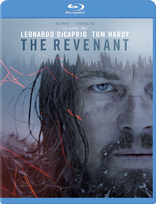The Revenant Blu-ray Movie
HomeThe Revenant Blu-ray Movie 
Blu-ray + UV Digital Copy20th Century Fox | 2015 | 156 min | Rated R | Apr 19, 2016
Movie rating
8.2 | / 10 |
Blu-ray rating
| Users | 4.5 | |
| Reviewer | 4.5 | |
| Overall | 4.5 |
Overview
The Revenant (2015)
A man of many adventures, Hugh Glass goes West in 1822 in the employ of Captain Andrew Henry to do some profitable fur trapping. He is attacked by a bear, and badly injured. Miraculously, he survives, but the terrain makes it impossible to carry him back. Henry tries, but eventually hires two mercenaries to simply stand watch and bury him. They abandon Glass, alone and defenseless, but unfortunately for them, he recovers. He resolves to hunt down the men who abandoned him.
Starring: Leonardo DiCaprio, Tom Hardy, Domhnall Gleeson, Will Poulter, Forrest GoodluckDirector: Alejandro González Iñárritu
| Adventure | Uncertain |
| Drama | Uncertain |
| Period | Uncertain |
| Western | Uncertain |
Specifications
Video
Video codec: MPEG-4 AVC
Video resolution: 1080p
Aspect ratio: 2.39:1
Original aspect ratio: 2.39:1
Audio
English: DTS-HD Master Audio 7.1 (48kHz, 24-bit)
French: Dolby Digital 5.1 (448 kbps)
Spanish: Dolby Digital 5.1 (448 kbps)
Portuguese: Dolby Digital 5.1
Subtitles
English SDH, French, Portuguese, Spanish
Discs
50GB Blu-ray Disc
Single disc (1 BD)
UV digital copy
D-Box
Packaging
Slipcover in original pressing
Playback
Region A, B (locked)
Review
Rating summary
| Movie | 4.5 | |
| Video | 5.0 | |
| Audio | 5.0 | |
| Extras | 2.0 | |
| Overall | 4.5 |
The Revenant Blu-ray Movie Review
Keep breathing.
Reviewed by Jeffrey Kauffman April 16, 2016Though even some diehard film fans seem to have forgotten about it, the harrowing tale of Hugh Glass’ survival in the hinterlands of the 1820s was told decades before The Revenant, in the frequently visceral 1971 film Man in the Wilderness. Neither Man in the Wilderness nor The Revenant shirk from the horrors Glass supposedly faced in his exile in forbidding conditions, but the irony about both of these cinematic depictions is that Glass may not in fact have experienced them, at least to the degree that has entered into legend. While Man in the Wilderness out and out fictionalized certain elements in the tale, including the name of the hero (transformed to Zachary Bass), The Revenant had an ostensibly more factual basis, Michael Punke’s historical novel of the same name which appeared in 2002. But some historians have questioned what exactly Glass went through after joining a fur trading expedition. While Glass himself evidently never memorialized his adventures (whatever they might have been), as early as 1824 some literary “adaptations” started appearing detailing Glass’ incredible fortitude in coming out alive after having been abandoned by his supposed team. Whatever the “truth” may be, there’s little doubt that The Revenant offers one of the most excruciating cinematic portrayals of a man (more or less) alone, battling the elements and utilizing whatever wits he’s able to muster to overcome almost unbelievable odds.
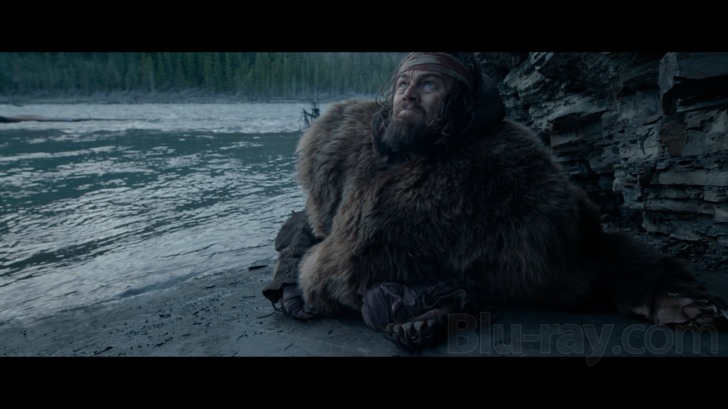
The rhythms of nature infuse The Revenant before the first imagery ever even hits the screen, with some evocative sound design that seems to suggest either breezes wafting through trees or perhaps the spectral whispers of the dearly departed. The Revenant’s distressing tale plays out against some of the most awe inspiring scenery ever caught on film (and for you sticklers, yes, The Revenant was digitally captured, this is a figure of speech), though it’s obvious that director Alejandro G. Iñárritu and cinematographer Emmanuel Lubezki want to emphasize both the imposing majesty of the American West as well as its inherent danger. Man is shown to be both a part of and apart from Nature, something that again informs the unfolding saga of Glass once he’s abandoned and left for dead after what has become one of the film’s infamous set pieces, an attack by a Mama Grizzly (so to speak) that leaves Glass hideously wounded.
Before that horrifying sequence unfolds, The Revenant quickly establishes some roiling and fairly dysfunctional interrelationships between a gaggle of men who have been on a pelt collecting mission. Glass has broken away from the group to hunt with his half-Pawnee son Hawk (a superb Forrest Goodluck). (The whole backstory giving Hawk a murdered Pawnee wife and “half breed” son is the source of some contention among historians who have looked into the actual record of Glass' life.) The main group is suddenly set upon by marauding Arikari, who kill several of the men before Glass and Hawk are able to get back and help shore up defenses. The upshot is that Glass, who is revealed to be the group’s guide, insists that the survivors get on their boat and hightail it out of there, something that does not sit well with Glass’ chief nemesis, a 19th century example of what almost might be termed a “white trash” mercenary named Fitzgerald (Tom Hardy). Quickly elided in this sequence is the fact that the Arikari chief (Anthony Starlight) is on the hunt for his abducted daughter, in what almost plays like the reverse of The Searchers.
After the attack, the survivors are holed up on a boat, though Glass again advises the expedition leader Andrew Henry (Domhnall Gleeson) that their best course of action is to ditch the transport and head off on foot, something that further enrages Fitzgerald since the few pelts they’ve been able to salvage from the attack will need to be left somewhere questionably safe so that the hike can proceed more efficiently. Some simmering tensions between Fitzgerald and Hawk also unfold at this point, something that informs one of the more disturbing developments as the story progresses. Without giving too much away for those who have yet to see The Revenant, suffice it to say that the bear attack changes everything, with Henry coming to the conclusion that the group can’t continue hauling an apparently mortally wounded Glass along with them. He enlists Fitzgerald and a young Jim Bridger (Will Poulter) to stay behind with Glass until he dies and then give him a proper burial before rejoining the main aggregation. It’s not much of a spoiler to state that things don’t exactly play out as planned, leading to the bulk of the rest of the film where Glass, motivated by an almost feral sense of vengeance, overcomes seemingly unbelievable odds to track down Fitzgerald and bring him to justice.
The Revenant is a surprisingly languid film, especially given some of its hyperbolic set pieces. But that very ambience is what gives the film some of its undeniable stateliness. It’s certainly arguable that some of the sprawling narrative could have been efficiently trimmed to no real detriment of the film, especially in the last half hour or so, but the slow, steady unfolding of Glass’ struggle to survive seems to reflect the timelessness of the environment in which it takes place. Another rather interesting element to The Revenant is its depiction of both Caucasians and Native Americans. If one tracks the general history of the western film in American cinematic history, it’s not too much of a stretch to state that probably through the forties (at least) a “Cowboys vs. Indians” ethos tended to predominate, with the “Indians” regularly being the villains of the piece. A reassessment of sorts started occurring in later decades where the interloping (largely) white pioneers are portrayed as more scheming and duplicitous, and the Native Americans assume a decidedly more noble status. The Revenant tends to suggest that there is good and evil in any given demographic. Therefore, the film has both saintly and sinning individuals in all groups. There are heroic Caucasians and Native Americans, and characters in both collectives who almost invite hissing and booing due to their despicable actions. That said, it’s not hard to see that the film’s sympathies lie largely with the Native American population who even at this relatively early point are seeing their lands and livelihoods being “stolen” (as the Arikari chief puts it) from them, and whose violent tendencies are therefore probably better understood than those of the "intruders".
It probably goes without saying that The Revenant is often quite difficult to sit through, something that has nothing to do with its perhaps overstuffed length. The film deliberately exploits the series of misfortunes which Glass is forced to suffer, in an onslaught of fate that would almost be funny if it weren’t so incredibly appalling. For those who can stomach the virtually nonstop accrual of blood and guts, The Revenant still provides a visceral viewing experience that is quite unlike anything I’ve personally seen in quite some time. Frontier justice has rarely been so powerfully portrayed, and DiCaprio and Hardy bring incredible commitment to two emotionally (and in the case of DiCaprio, physically) demanding roles. Also at the top of their games are Iñárritu and Lubezki, both of whom (along with DiCaprio, of course) won well deserved Academy Awards. Iñárritu’s by now well documented proclivities toward magical realism (as evidenced by both Biutiful and Birdman) are perhaps more organically woven into The Revenant’s otherwise grimly gritty tale of desperation than in those previous films, offering glimpses of improbable hope in even the most hopeless circumstances.
The Revenant Blu-ray Movie, Video Quality 
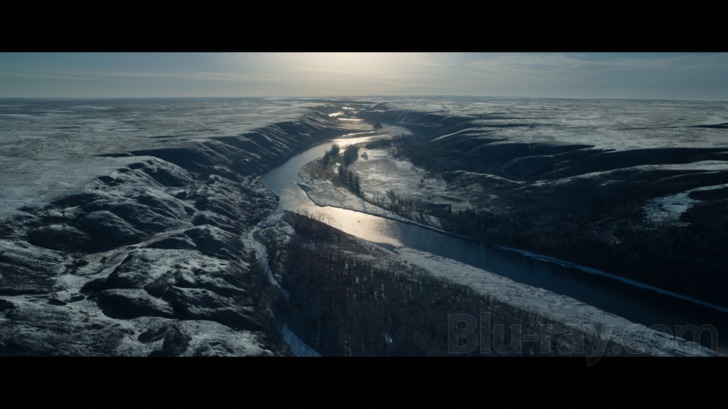
The Revenant is presented on Blu-ray courtesy of 20th Century Fox Home Entertainment with an AVC encoded 1080p transfer in 2.39:1. The IMDb lists this as having been captured (by a variety of Arri Alexa cameras) at two source formats (6.5K and 3.4K) from which a 4K DI was culled. (Many fans will already know that The Revenant 4K will be streeting day and date with this 1080p version, and I'll be reviewing that iteration as soon as it arrives.) This is quite simply one of the most staggeringly awesome collections of natural vistas I've personally encountered on home video, one which has been transferred to the Blu-ray medium with extreme precision and almost haunting beauty at times. Emmanuel Lubezki both literally and figuratively captures some incredible moments here (some of which at least seem to have been done without the aid of CGI). "Little" moments like glints of sunlight through Spanish moss on trees or embers floating heavenward from a fire or a sudden passel of clouds wafting through some high trees offer excellent levels of fine detail, along with precise renderings of sometimes minute elements. Iñárritu gave some interviews during the filming of The Revenant where he insisted no artificial lighting would be employed during the shoot, and that does seem to be the case, but perhaps the most surprising thing about this is the really excellent levels of shadow detail in many dark, dimly lit or outright nighttime scenes. Many of the daytime elements have a slight bluish tint, and other moments are distinctly on the yellow or sepia side of things, but the grading choices never really materially affect detail levels in any meaningful way. Fine detail in close-ups can be fairly stomach churning at times as various wounds are shown in all their "glory". The palette is intentionally tamped down much of the time, though, giving some of the film something of the ambience of an old daguerreotype. Contrast is well maintained throughout the presentation, offering clear delineation in (to cite just one example) various tones of white when Glass is stranded in an icy wilderness. The monochromatic proclivities of long sequences of the film only tend to make sudden pops of color (which can often be of rather shocking things like an animal's entrails) all the more vivid. Finally, there are no instances of image instability and no overt compression issues.
The Revenant Blu-ray Movie, Audio Quality 
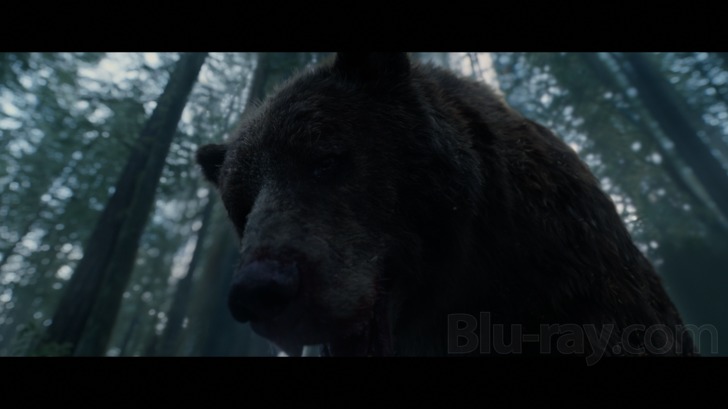
The Revenant's lossless DTS-HD Master Audio 7.1 mix has both incredibly subtle and rather forceful uses of surround activity. On the subtle side of things, the gentle wafting of Glass' wife's voice in various dream sequences is effective and rather spooky at times. On the forceful ledger the huge Arakari attack which opens the film offers some fantastic (quick) panning effects as arrows strike their target and some good lower frequency punches as muskets are fired. The film is awash with the sounds of nature, and various sequences offer things like rushing rivers or gentle breezes clearly floating through the side and rear channels. An occasionally anachronistic score by Ryuichi Sakamoto and Alva Noto also regularly employs the side and rear channels. There's actually not a ton of dialogue in The Revenant, at least for its long second act when Glass is stranded and due to his wounds barely able to make a sound, let alone talk. That leaves the soundtrack to be filled with ambient environmental noises, which offer a routinely realistic accounting of the various locations Glass finds himself in. Fidelity is top notch and dynamic range wide on this problem free track.
The Revenant Blu-ray Movie, Special Features and Extras 
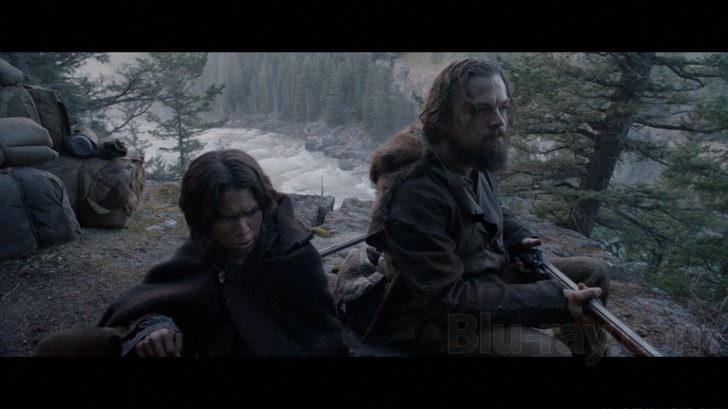
- A World Unseen (1080p; 44:04) is the superb making of documentary which was released on YouTube earlier this year. There's a lot of fascinating behind the scenes information (and footage) as well as some very worthwhile interviews.
- Gallery (1080p; 5:48) features both an Auto Advance and a Manual Advance option. The timing is for the Auto Advance option.
The Revenant Blu-ray Movie, Overall Score and Recommendation 
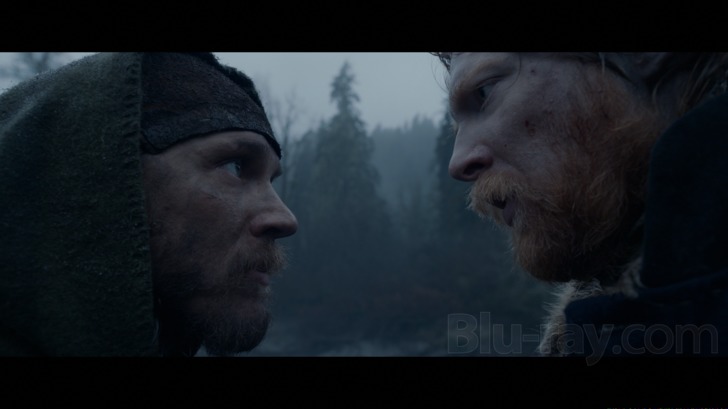
The Revenant may seem on its face to be a 19th century Death Wish, but the emotional depth of this piece, along with its truly astonishing cinematography, make this one of the most unique viewing experiences in recent memory. There's arguable over-length here, but that's probably the only quibble most folks will have with what is one of the most incredibly visceral presentations of man vs. nature (and man) the world of cinema has ever seen. Technical merits are virtually flawless, and The Revenant comes Highly recommended.
Other editions
The Revenant: Other Editions
Similar titles
Similar titles you might also like

Everest 4K
2015

War for the Planet of the Apes
2017

In the Heart of the Sea 4K
2015

The Martian 4K
Extended Edition
2015

Sanctum 4K
2011

Interstellar 4K
2014

Black Sails: The Complete Collection
2014-2017

The Nightingale
2018

The Legend of Tarzan
2016

Gladiator 4K
2000

San Andreas 4K
2015

Hidalgo
2004

Firefly: The Complete Series
15th Anniversary Edition
2002

Pompeii
2014

Life of Pi 4K
2012

Noah
2014

Battlestar Galactica: The Complete Series
2003-2009

Indiana Jones and the Last Crusade 4K
1989

Spartacus: Gods of the Arena
2011

Apocalypto
2006
